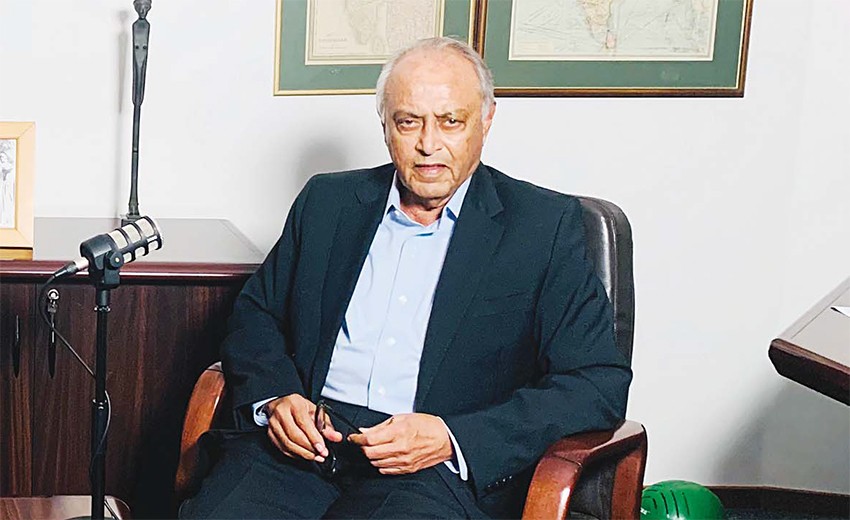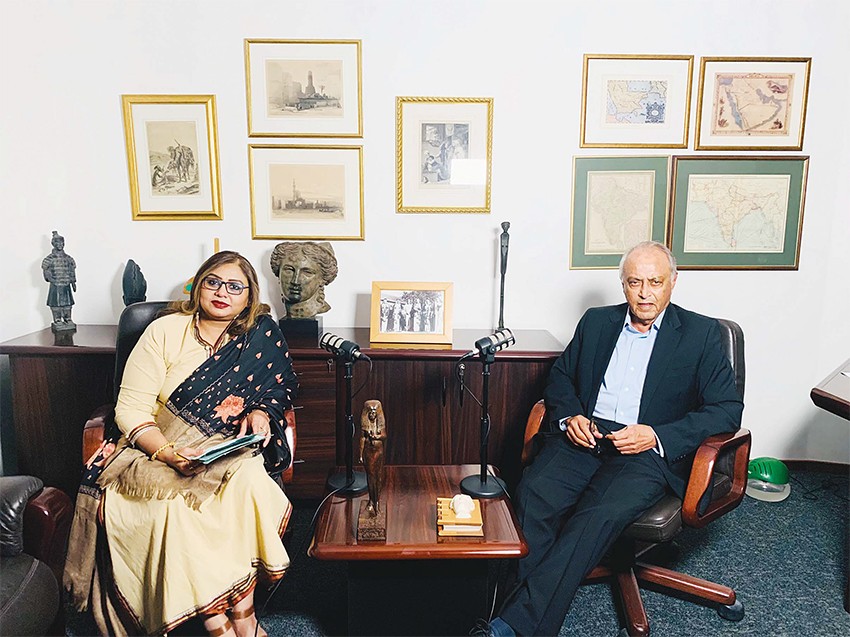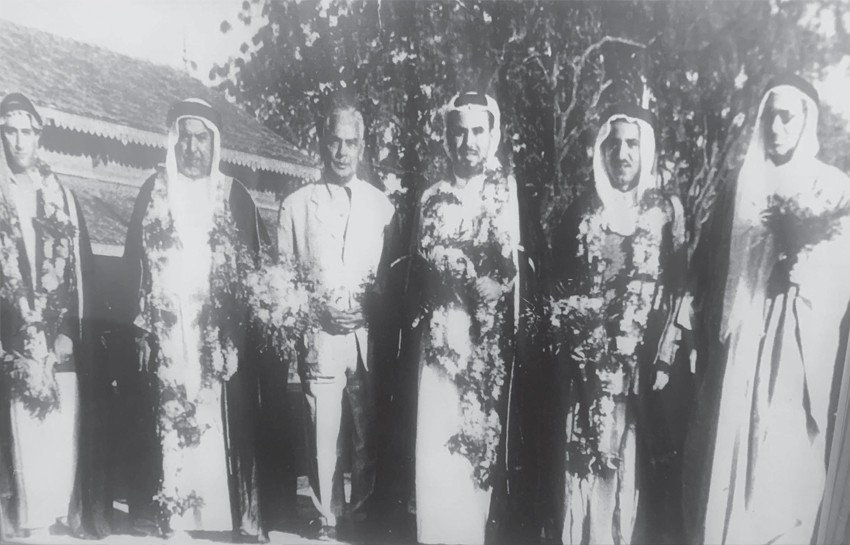11/08/2022
11/08/2022
I met with Mr Tony Jashanmal, Group Executive Director of the Jashanmal Group to record an episode of Sadaaqa. This show documents Indo-Kuwait friendship in its many nuances. The Jashanmal story is an extraordinary story of the enterprise and assimilation of an Indian business family in Kuwait. In 1919, the Jashanmals migrated from India to Basra after the First World War.

Some years later, in 1934, Rao Sahib Jashanmal, patriarch of the family, opened the first departmental store in Kuwait at the invitation of the British and the Al Sabah family. With time, the destiny of this leading Indian business family got inextricably linked with the development of the Arabian Gulf. Tony Jashanmal is a charismatic personality.
He is multilingual. He left a PhD midway to join the family business in 1971. The group he heads includes an enormous retail and distribution empire across the UAE, Kuwait, Oman and Bahrain and a distribution network of over 1,000 outlets. In the following conversation, Mr Jashanmal speaks of his family, whose roots in the region go back to just about a hundred years, about the growth and evolution of Kuwait, his memories of the invasion and his love for the country.

Arab Times: You are head of one of the largest trading companies in the region. Why did your family migrate to this part of the world? Why did they choose to leave the subcontinent and settle down in this part of the world?
Tony Jashanmal: The Ottoman Empire started crumbling after the First World War. They lost the whole southern region, which was then divided into five countries, Iraq, Jordan, Palestine, Lebanon and Syria. The British and French took over the administration of this region. Britain administered Iraq, Jordan and Palestine, whereas France looked after Lebanon and Syria. Iraq was administered by British India and controlled out of Delhi and less out of London. Many people in India, both British and native, regarded this region as an extension of the British Empire. The British shipped materials, food and people from India to Iraq. Along with military men, many Indian traders also came to this region. In my grandfather’s case, it started as a visit with his brothers and friends to see a new land. To Indians Arabia was an exotic land. We read about Arabia from our childhood. When he arrived in Iraq, it felt like an extended neighbourhood. It was nearly the same life but different in many ways. My grandfather saw the fast development that was happening especially in the port city of Basra. He realized there might be a chance of doing some business there.
AT: So he saw potential?
Tony Jashanmal: Yes. So he and his brothers decided to give it a try. They started this business.
Arab Times: What did they trade-in?
Tony Jashanmal: Anything the people needed. People were settling down in large numbers in Basra. Things had to be imported. The British were coming in large numbers. There was a high demand for things they needed, including the clothing they wore and the home products they needed to live well. So they wanted things like Wedgewood pottery, and we supplied that as well.

Arab Times: Did your grandfather face any challenges?
Tony Jashanmal: I don’t think the challenges are that many you get very busy and business was booming. The one big thing he did and still practices today was the import and distribution of newspapers, magazines and books. These people were coming in and settling in Basra, and they needed news of the outside world, especially British news and Indian news because they had families and might have connections in India. My grandfather used to supply newspapers even though one or two days late. He would bundle the seven weeks of news and distribute them. Until today, we are the main importers and distributors of all the foreign press.
Arab Times: Mr Jashanmal, did your grandfather migrate with the family? I mean with the women and the children?
Tony Jashanmal: No, no, not right away. Because he was setting up a business, etc., .then, in the 30s, he brought his wife over. So if I take anybody in our family who is now in their 90s or even 80s was born in either Iraq or Kuwait.
Arab Times: So what made your family come to Kuwait?
Tony Jashanmal: It is connected to what happened after the First World War. In those days, oil was produced basically in the United States, Iran and Iraq, and It was enough for the requirements of the world. After the First World War, the industrial revolution started worldwide. And oil demand went up tremendously. They started searching in this part of the world. They found some in Bahrain, but the quantity was small. In Kuwait, it was huge. By that time, our business in Basra was booming. My father had joined my grandfather in Iraq. My grandfather sent my father to Kuwait to see prospects. By then, Colonel Harold Dickson, the top British official in Basra, was asked to come to Kuwait to oversee oil prospecting. He became what is called Kuwait’s first Political Agent.
Arab Times: Your family knew Colonel Dickson?
Tony Jashanmal: He knew my grandfather. Colonel Dickson told him that now that Kuwait had discovered oil, many people including Britishers and Americans would relocate to Kuwait with their families. Kuwait was a desert town, and they would need products like the ones we supplied in Basra.
Arab Times: So you were the first Indian traders to relocate to Kuwait?
Tony Jashanmal: We were one of the first. The Malhotras followed a short while later. And others came slowly from India and Iraq. We opened the first shop in downtown Kuwait. There used to be a huge empty ground there at that time. The camels came in through the gates and were parked there on the floor. Later, when the bus service started, the bus stop was next to our shop. Women would visit the shop on these buses which plied two or three times a day and do their shopping. They would visit the store when the men were in the oil fields or offices.
Arab Times: Mr Jashanmal, over the years, enterprising Indians have gone to different parts of the world, including Africa, Southeast Asia, and the Caribbean. They have, in a way become a part of the soil. You belong to a family, one of the first Indian families to migrate to the Middle East and to the GCC. How was this journey of assimilation for you?
Tony Jashanmal: My grandfather was a great realist. He used to say in Rome, do as the Romans. You know, that’s the best way to fit into any place.
Arab Times: And then your family and company spread to other parts of the GCC?
Tony Jashanmal: It was mostly by invitation. That became the blueprint.
Arab Times: Were you born in Kuwait?
Tony Jashanmal: Yes, at the American Mission Hospital.
Arab Times: Wow. That’s the first hospital in Kuwait!! Many prominent Kuwaitis were born there. Did you live nearby?
Tony Jashanmal: I remember living behind the store on Safat Square. It was a nice house with a large housh. It was a very pleasant place to grow up. We always had some family members there. It was true that life was tough; there was no air conditioning. But then we did not know about air conditioning, so how could we miss it? I remember the khuskhus curtains and water being sprayed on them. These wet curtains brought in cool air from outside. This was in the spring. In October and November, we slept out on the terrace. It was a different time, a simple time.
Arab Times: Where were you educated?
Tony Jashanmal: I was sent to India at age five as there were no English language schools in Kuwait. Many Kuwaiti, Saudi, Bahraini and Emirati families sent their children to India for studies. In fact, at times, I would be the only Indian born in Kuwait studying in Bombay; the rest were all locals from the Gulf.
Arab Times: You were educated abroad. You could have even chosen to stay abroad, but you decided to come back. Was it a foregone conclusion that you had to join the business?
Tony Jashanmal: I left India at 12 and went to Switzerland. By this time, our business was growing, and our connections with foreign companies and countries were increasing. Our elders felt it would be better if the future generation also started getting educated in developed countries. After my education, I wanted to join an international organization. I had learnt French and German, in school. I went to University in Hamburg. I was in the middle of my PhD when my father suddenly died. I came back to look after legal formalities, and then I just stayed back trying to sort out issues. There were too many business and property matters to take care of.
Arab Times: The Jashanmals have been in Kuwait for almost 100 years. The company has been a part of the evolution of Kuwait from a trading nation to an oil economy. How has your organization contributed to that growth?
Tony Jashanmal: The thing is you grow with the community. I remember my grandfather saying, everyone has a role in society. The doctor has his role. The teacher has his role. Our role is to trade and bring to the community the goods and services it needs.
Arab Times: I think you also got involved in education?
Tony Jashanmal: All of us got involved with education. My mother was instrumental in founding the first Indian school in Kuwait. I was on the board of that school many times. Later, when the school became overfull, we started another school called the New English School because, in Kuwait, there was a regulation that all foreign schools had to be community schools. They were not profit-making organisations. The rules changed after the liberation.
Arab Times: I wanted to ask you about the invasion. That must have been very traumatic for you as an family.?
Tony Jashanmal: My family was here during the invasion. My wife is half German- Dutch and they were on the lookout for foreigners. From the first day, I got involved in the evacuation efforts and looked after the people in distress. I recall the then-Indian ambassador Mr Buddhiraja calling me, saying, “Tony, I have so many people coming to the embassy. We don’t have enough people to handle this. We need help.” So we formed a support group among the 13 of us and, divided Kuwait into 13 areas, looking after the needs of the people in those areas. The borders were closed.
Arab Times: That must have been rough.
Tony Jashanmal: It is during tough times that people rise to the occasion. You don’t have time to think; you deal with it. At that time, I was the chairman of the New Indian School. We decided to house the people in the school. People ate, slept and lived there until arrangements were made. One of my favourite memories of Kuwait is the day I returned after the liberation. You know, I left a couple of months after the invasion. We knew that Kuwait would be liberated and normalcy would be restored, but the day I left, I felt very sad. I asked the group to give me an hour. I drove my car alone all around Kuwait. There was so much uncertainty. Kuwait had been my home for so many years. I had to take a close look at it before I left. And therefore I was very, very happy when I came back.
Arab Times: What happened after liberation?
Tony Jashanmal: Kuwait was closed to everybody after liberation because the liberating armies made up of the British, Americans and others wanted first to enter and clean it so that people could return to their homes. I had been in Bahrain and was one of the first to come in. There was no army, no police, and no electricity. We tried to reestablish our homes and business. Our warehouses had been plundered. It wasn’t good. Somehow we managed to put together one shop in Salmiya. That was the first street in Kuwait to get lighting after the war. We had the advantage of having stores all along the Gulf, Bahrain, and the UAE. We could get goods from there by truck. There were landmines in the sea so the ships couldn’t come in. Flights couldn’t come in there because of the 700 oil well fires burning. Land was the only option. Those were the challenges. One did not just come in and start again. It was a difficult process.
Arab Times: You didn’t give up when the situation was challenging. And there were many ex-pats like you.
Tony Jashanmal: My grandfather used to say, ‘Look, If you’re thinking of coming back after you finish your education, remember, you’re coming to a potentially volatile area. Oil is a huge natural resource and so there is always turmoil in oil-rich lands. I’ve had three major ups and downs, including the World War; I don’t think you will have three. I hope you will not have to, but you should be prepared, even at least for one. So if you want to live in such an area where there is a possibility of trouble, don’t cry over spilt milk. Don’t think of what you all had in the past. Get down on your knees, get on with the work. The opportunity is there; you will come up again.” And that is exactly what we did.
Arab Times: In a way, Mr Jashanmal, your company is a symbol of the history of cooperation and friendship between Kuwait and India. And I would like to ask you now about the thousands of expatriates, particularly Indians, who have set up a business or as professionals, who have made this place their home. How big is their contribution to the evolution and growth of Kuwait?
Tony Jashanmal: Well, I think the numbers speak for themselves. They are here, either as a businessman or providing some service to the country either as doctors or professionals or to the families as domestics, drivers, gardeners, or whatever they might be. Still, all of them are doing a service to the country directly or indirectly. They all earn money like anybody should, for any work they do. Everybody is contributing, and that’s important.
Arab Times: I want to end with this photograph, which shows your grandfather with Sheikh Abdullah Salem. Tell us more about this, please.
Tony Jashanmal: Sheikh Abdullah was then the Amir of Kuwait. He used to go to India very often. He owned a couple of properties in India He spent his summers there. By that time, my grandfather had retired to a small town in the hills outside Bombay. It was three and a half hours away by train. So when Sheikh Abdullah visited India either my grandfather would drive up to Bombay to meet him, or Sheikh Abdullah would take the train to that tiny hill station to meet my grandfather.
Arab Times: It shows the great respect that was accorded to your grandfather.
Tony Jashanmal: It was mutual. It was more than respect. They were old friends. By Chaitali B. Roy Special to the Arab Times


